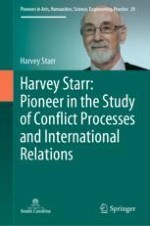
2021 | OriginalPaper | Buchkapitel
1. Getting from Then to Now: A Personal Intellectual Autobiography
verfasst von : Harvey Starr
Erschienen in: Harvey Starr: Pioneer in the Study of Conflict Processes and International Relations
Aktivieren Sie unsere intelligente Suche, um passende Fachinhalte oder Patente zu finden.
Wählen Sie Textabschnitte aus um mit Künstlicher Intelligenz passenden Patente zu finden. powered by
Markieren Sie Textabschnitte, um KI-gestützt weitere passende Inhalte zu finden. powered by